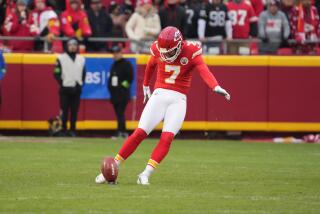COMMENTARY : Blame Boys in Booth If NFL Throws Flag on Instant Replays
Last Sunday, a replay official named L. T. Bonner held up the Dallas-Miami game 14 times to review plays. Only one call was changed--a punt was spotted at the 3-yard line instead of the 1.
The game lasted 3 hours, 14 minutes, about half an hour longer than it would have.
“I don’t know what they were doing up there in the replay booth,” Dallas Coach Jimmy Johnson said. “But I’ve already said enough bad things about instant replay. It just takes away from the flow and excitement of the game.”
If instant replay is finally done in at the NFL owners’ meetings next March, it will be because of delays caused by Bonner and other replay officials, not because of the major controversies that have Mike Ditka, among others, swearing they’ll never vote for replay again.
Even the league concedes the problem.
“I think it’s accomplished what it set out to do,” says Joe Browne, the NFL’s director of communications. “The downside is that too many plays are reviewed and it’s taken much longer than the 15 to 20 seconds that they promised.”
The man considered replay’s father has the same view. “The only negative is interruption,” says Tex Schramm, who was twisting in his seat at Texas Stadium last Sunday while Bonner pondered the obvious.
And so does the man who will have a big say in replay’s fate.
“It’s time consuming, it stops the flow of the game, there are too many delays,” says Jim Finks of the New Orleans Saints, who has replaced Schramm, now commissioner of the NFL’s new international venture, as chairman of the rule-making competition committee.
In fact, as replay sputters through its fourth year, it’s obvious that the guys in the booth are spending more of their own time--not to mention the time of players, coaches and fans--trying to determine the validity of plays.
In 1986, the first year of replay, 374 plays were reviewed--an average of 1.7 per game--and 38 overturned.
In 1987, there were 490 reviews in the strike-shortened 15-week season--an average of 2.3--and 57 were overturned.
Last season, 537 were reviewed--2.4 per game--and 53 overturned.
This year, through 10 weeks, fewer plays were actually reviewed but more were reversed; of the 283 reviewed--two a game--50 had been overturned. That’s 17.7%, a full six percentage points higher than the previous high in 1987, indicating that replay officials are being more selective.
But those numbers are dry stuff compared with the passion that replay has engendered with a handful of controversial plays.
Two occurred in the fifth week of the season.
In New Orleans, San Francisco’s Jerry Rice clearly fumbled a ball out of the end zone before crossing the goal line. But the play never was reviewed and instead of the Saints getting the ball at their 20 on a touchback, it was a touchdown for the 49ers, who ended up winning 24-20.
Replay official Gaylord Bryan was suspended for his oversight on that one.
In Philadelphia, the Eagles’ Randall Cunningham appeared to go down two yards short of the goal line, then stretch the ball over the line. It was called a touchdown on the field, the replay was ruled “inconclusive,” and the Eagles went on to beat the New York Giants 21-19.
“Inconclusive!” harrumphed Giants’ General Manager George Young, who has voted against replay every year. “The whole thing is inconclusive.”
But the most telling play occurred in the Chicago-Green Bay game Nov. 5.
The Packers trailed 13-7 and faced a fourth-and-10 at the Bears’ 14 with 40 seconds left. Quarterback Don Majkowski dropped back, then began rolling to the right toward the line of scrimmage, finally throwing an apparent game-winning touchdown pass to Sterling Sharpe.
But line judge Jim Quirk had thrown a yellow flag. Majkowski, announced referee Tom Dooley, was past the line of scrimmage when he threw the ball, so there was no touchdown. All the Bears had to do was kill 32 seconds to win.
Then the replay booth took over while everyone waited . . . and waited . . . and waited. They waited four minutes for replay official Bill Parkinson’s decision. It was a reversal--Majkowski was at the 15 when he threw; it was a touchdown.
Packers win, 14-13.
“You can’t tell me it’s clear cut if it takes four minutes to make the decision,” the Bears’ Ditka said the next day.
“I would be hard-pressed to say the rule would be passed again. At least one vote against it is now solidified.”
Finks says of Ditka’s outburst: “I think what Mike and other coaches say during the season is passion in the heat of the moment.”
Will replay be renewed?
The consensus is that with the retirement of Commissioner Pete Rozelle, another of its strong proponents, and the absence of Schramm, it has little chance of getting the 21 votes necessary for renewal. One vote has already changed--where Schramm was replay’s most solid vote, Jerry Jones, Dallas’ new owner, says he’ll vote against it “no matter what.”
But “no matter whats” have a way of changing when reason is brought into it.
“It’s a fact of life now,” Schramm says. “You can’t just take away something the fans are used to.
“You know it will be there whether we have it or not,” says Finks, who says he’s hasn’t made up his mind.
“What will happen the first time TV shows that a call was wrong? The same people who wanted it abolished will wonder where it went?”
More to Read
Go beyond the scoreboard
Get the latest on L.A.'s teams in the daily Sports Report newsletter.
You may occasionally receive promotional content from the Los Angeles Times.










